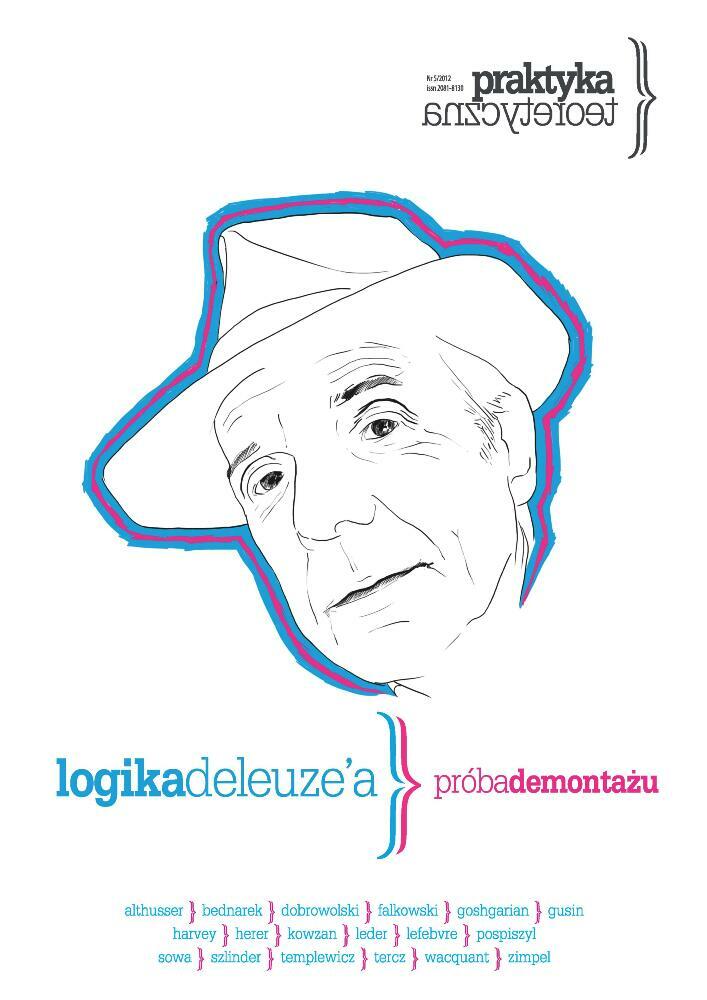Abstract
Gilles Deleuze is well known as a philosopher who had a profound debat
with psychoanalysis. This debate cannot be reduced to a critic of psychoanalysis
alone because the universe in which Deleuze thinks and writes is heterogeneous
and plural. In Logic of Sense, Freud’s project, enriched by Melanie Klein or Jacques
Lacan, is to point a metaphysical potentiality in the concepts of psychoanalysis.
Psychoanalysis is called a “science of events” to create a net of connections between
various series of the psychoanalytical insights. In my paper, I have tried to show
how Deleuze determined the introduction to the debate with psychoanalysis. The
key concept for his introduction is the notion of “phantasm” that is also rooted in
the philosophical tradition.
References
Deleuze G. 1997. Różnica i powtórzenie. Warszawa: Wydawnictwo KR.
Deleuze G. 2003. Note pour l’edition italienne de Logique du sens. W Deux regimes de fous. Paris.
Deleuze G. 2005. Negocjacje: 1972-1990. Wrocław: Wydawnictwo Naukowe Dolnośląskiej Szkoły Wyższej Edukacji TWP we Wrocławiu.
Deleuze G. 2011. Logika sensu. Warszawa: Wydawnictwo Naukowe PWN.
Foucault M. 2006. Słowa i rzeczy: archeologia nauk humanistycznych. Gdańsk: Słowo/obraz terytoria.
Freud Z. 1996. Dwie nerwice dziecięce. Warszawa: Wydawnictwo KR.
Freud Z. 1996. Uwagi na temat pewnego przypadku nerwicy natręctw. W Charakter a erotyka. Warszawa: Wydawnictwo KR.
Lacan J. 1956. Le mythe individuel du névrosé. Paris.
Lacan J. 2006. Le Séminaire. Livre XVI: D’un autre à l’autre (1968-69). Paris.
Laplanche J., J.B. Pontalis. 1996. Słownik psychoanalizy. Warszawa: WSiP.
Leclaire S.. Psychanalyser. Paris 1968.
Milner J.C. 1995. L’Oeuvre claire: Lacan. la science. la philosophie. Paris.
Williams J. 2009. Gilles Deleuze’s Logic of Sense: a Critical Introduction and Guide. Edinburgh: Edinburgh University Press.
License
“Theoretical Practice” seeks to put into practice the idea of open access to knowledge and broadening the domain of the commons. It serves the development of science, thinking and critical reflection. The journal is published in open-access mode under the CC-BY-NC-SA 4.0 license (detail available here: http://creativecommons.org/licenses/by-nc-sa/4.0/). Articles published in the journal may be freely distributed, stored, printed and utilized for academic and teaching purposes without restrictions.
They should not be, however, used for any commercial purposes or be reconstructed into derivative creations. Access to the journal may not be limited or offered for a fee by any third party.
Prospective authors are obliged to fill in, sign and send back the publishing contract compliant with the CC licencing. [PL.pdf, PL.doc, EN.pdf,EN.doc].
According to this contract, authors grant the journal a non-exclusive right to publish their work under the creative commons license (CC-BY-NC-SA 4.0) without any financial obligation on both sides of the contract.
Before submission authors should make sure that derivative materials they use are not protected by copyright preventing their non-commercial publication. Authors are responsible for any respective copyright violations.
